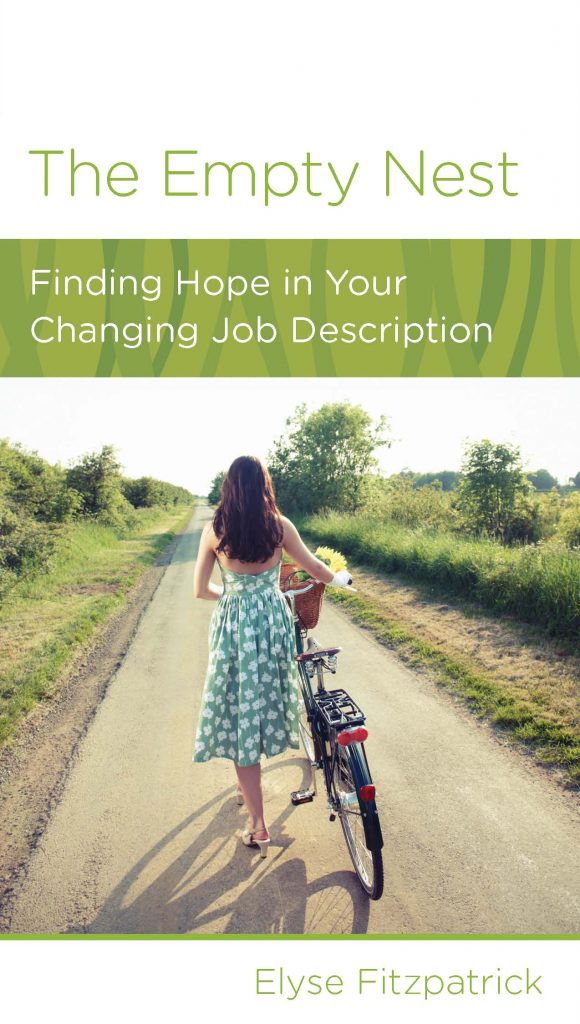A friend and I attended Parents Orientation at our kids’ college. It was an exciting time for our kids but, frankly, not for us. “How did we get here?” we both wondered. “I don’t understand,” my friend said through tears. “Why would God command us to pour our lives into our children and then make us let them go?” We both shook our heads in dismay.
The empty nest—that time of life when children leave home to pursue their own adult lives—can be a time of confusion, tears, and purposelessness for the parents left behind, especially the mothers. Has it been that way for you? Are you wondering, as I did, what happened to those little bare feet running through the house, to the wild screaming and laughter at swim parties, to the Little League games that seemed like they’d never end, and to the holiday dinners with everyone crammed around the table talking all at once? As a mother of three (and now grandmother to six), I know that sad and empty feeling. I remember when my youngest was married. “Okay,” I wondered, “just what am I supposed to do now?”
Why does God give us children and then take away what he’s given? As I asked myself that question, my mind traveled back to a surprising statement made by one of my college professors. He said, “Life is a series of divestitures.” Over the years I’ve grown to see how true that statement is. Here’s how the truth of lifelong divestiture, lifelong change and loss, is framed in Ecclesiastes 3:1−8:
For everything there is a season,
and a time for every matter under heaven:a time to be born, and a time to die;
a time to plant, and a time to pluck up what is planted;
a time to kill, and a time to heal;
a time to break down, and a time to build up;
a time to weep, and a time to laugh;
a time to mourn, and a time to dance;
a time to cast away stones, and a time to gather stones together;
a time to embrace, and a time to refrain from embracing;
a time to seek, and a time to lose;
a time to keep, and a time to cast away;
a time to tear, and a time to sew;
a time to keep silence, and a time to speak;
a time to love, and a time to hate;
a time for war, and a time for peace.
Ecclesiastes 3:1−8
Ecclesiastes tells us that life is marked by ongoing change, gaining and losing, divestiture and seasons. If this beautiful poetry teaches us anything, it is that nothing in our lives stays the same. The “time” that we’re in right now, the empty nest, might seem as though it is only a time of loss. In some ways, that is true. But if you look at it from another perspective, could it be something more than loss? Could it be a time of blessing, of adding, of refocusing your remaining relationships?
Please don’t misunderstand what I’m saying here. I agree that it’s normal to feel loss and to grieve when there are major changes in deep and meaningful relationships. We know that grieving isn’t wrong because Jesus himself grieved at the tomb of his friend Lazarus. He deeply felt the loss when his friends slept through his hour of greatest need at Gethsemane. Grief at suffering isn’t sinful, but it is meant to draw us closer to the Lord who knows all about it. Grief is meant to eventually help us see that God truly understands.
In the School of Seasons
So let me ask this question again: why does God give to us and then take away what he’s given? Could it be that he’s teaching us about our nature and his? Could it be that we need to be reminded that he is to be the ultimate focus of our lives? Could it be that he wants to draw near to us through our tears?
Change and seasons have been part of our world since the first day of creation. God caused a variation between day and night and called this change “good.” After the flood, the Lord promised Noah that there would be changes, but that he would sustain the earth through them all: “While the earth remains, seedtime and harvest, cold and heat, summer and winter, day and night, shall not cease” (Genesis 8:22). This promise was meant to reassure Noah (and us) that seasons would come and go, but God would maintain his creation until the end of time.
Have you ever wondered why God built change and seasons into our lives? He built these fluctuations into our lives so that we would learn about ourselves. Our need for sleep and our dependence on the rain for food teach us of our limits and weakness. We can send a man to the moon, but if the Lord doesn’t send rain, we don’t eat. The changing nature of our world teaches us that we aren’t in charge. We can’t control the seasons. We can’t make rain, stop the tides, or calm the wind. We grow old, we lose vitality, and we stumble. We’re dependent, needy, and weak. It is good to learn this about ourselves; otherwise we might not stop to “number our days” as Psalm 90:12 advises.
Of course, we all acknowledge that everyone is growing older and that our lives are bound to change. But when it comes to our day-to-day living, we assume that things will stay just as they are. Then the seasons change, the kids move out, and we’re reminded of the truth.
The seasons also teach us about God. They teach us that he is different from us—completely self-sufficient and independent. There are no seasons for the Lord—only glorious, eternal, jubilant day. James writes that he is “the Father of lights with whom there is no variation or shadow due to change” (James 1:17). He never changes and he has assured us that we can depend on him to be “the same yesterday and today and forever” (Hebrews 13:8).
Your perspective on this season of the empty nest will be colored by what you understand about the purpose of change and what it can teach you about yourself and God and life. Your perspective on your empty nest will also be colored by the way you approach your relationships with your spouse and your kids and, most importantly, your relationship with the Lord.
Seasons Can Be Beautiful
What will this season be for you? Will it be a time of sorrow and grief? Yes, probably. Will it also be a season of growth and renewal of relationships? I hope so.
God has built ongoing change into our lives, so he teaches us to live every day in the steadfast love and new mercies he supplies for that day (Lamentations 3:22−23). Paul encourages us to forget what’s behind and strain forward to what lies ahead, pressing onward “toward the goal for the prize of the upward call of God in Christ Jesus” (Philippians 3:13−14). This difficult time may be the change you need to draw closer to Christ and learn of his love for you.
The truth is that we can’t go back; we can’t relive the old days. Yesterday is gone. We can’t make what was wrong right or even re-create the beautiful times of loving family life. Are you ready to put your past in its place, to press forward, to see God’s steadfast love and new mercies? Can you smile because you know that your Savior is there waiting for you? Trust him in this new season of life, and discover all he has prepared for you.
Excerpted from The Empty Nest: Finding Hope in Your Changing Job Description © 2012 by Elyse Fitzpatrick. Used by permission of New Growth Press. May not be reproduced without prior written permission.
The empty nest
Your children are growing up and leaving home. You know this is a good thing, but at the same time, you’re wondering who you are when you’re not busy being your children’s mother. You know this is a new season of life, but it’s hard not to look back with longing and sometimes regret. How do you adjust to this new season of life?






